A technical loophole is allowing the theocratic regime in Iran to skirt the full force of economic sanctions meant to compel the country to give up its nuclear ambitions.
A recent letter from a bipartisan group of U.S. Senators to the presidents of the European Council and European Central Bank has shed light on a problem that has given Iran a backdoor way to gain access to foreign currency reserves, which it desperately needs to help stabilize a teetering economy, according to media reports.
At issue is the Iranian use of the European Central Bank’s Trans-European Automated Real-time Gross Settlement Express Transfer System—also known as Target 2. This allows Iran to convert Iranian rials into euros. With euros in hand, Iran has far more latitude to conduct foreign transactions than it otherwise could with their increasingly worthless currency.
The Senators urged the European Central Bank to immediately block Iranian access to Target 2.
The news couldn’t have come at a worse time, as Iran continues to advance its nuclear program and Chuck Hagel takes over at the Pentagon. While the U.S. and European allies hope that economic sanctions will help persuade Iran to abandon its nuclear program, Monday’s revelation casts doubt on the effectiveness of these efforts.
That such a major loophole allowing Iran financial maneuverability exists through a mechanism of the European Central Bank is hardly reassuring. Indeed, the flaw within sanctions leads to the more troubling concern that the U.S. and European strategy that seeks to pressure Iran to give up its nuclear program may be based upon the false premise that the Iranian economy is at its breaking point. If the ability to access foreign currency is helping to stabilize the economy of Iran, then the effect of diplomatic pressure from the U.S. and allies is greatly diminished.



























